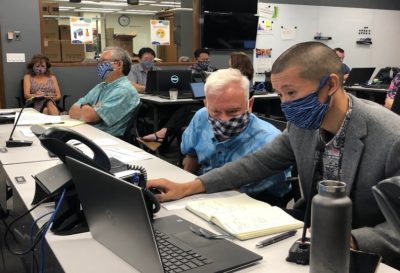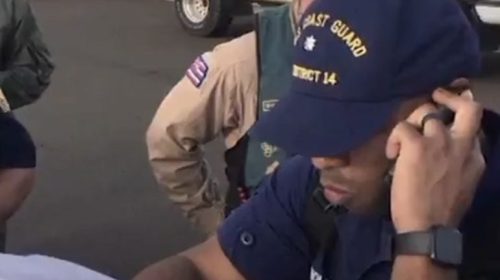Honolulu Emergency Operations Center in Partial Activation
Mayor Kirk Caldwell gathered directors, deputy directors, and staff at the Honolulu Emergency Operations Center (EOC) to discuss the onset of Hurricane Douglas. O‘ahu residents are asked to prepare for strong winds, dangerous surf, heavy rainfall, and potential flooding over the upcoming weekend.
As O‘ahu prepares for the possible impacts of Hurricane Douglas, Mayor Caldwell has signed an Emergency Proclamation. The proclamation authorizes expenditures of funds for a quick and more efficient relief effort ahead of the coming storm and allows changes to the Restore Honolulu Order. For example, indoor gatherings of 50 individuals or more will be allowed as residents may need to seek shelter in a hurricane emergency shelter.
Mayor Caldwell has also activated the city’s EOC in order to manage the City’s response and to coordinate efforts with the state. The EOC will switch to a 24 hour schedule as the storm approaches O‘ahu. Depending on the forecast, the City and County of Honolulu will be opening up to 25 shelters at various locations around O‘ahu in coordination with the American Red Cross.
“Hurricane Douglas is expected to weaken but remains on track to pose a serious threat to O‘ahu,” said Mayor Caldwell. “This weekend, beginning tomorrow night, we could see heavy rain and strong winds. We’ll continue to keep our full attention focused on Douglas throughout the evening, and proceed with full activation of the Emergency Operations Center later this weekend. We are asking everyone to pay attention to any alerts overnight. Take the time to check on your loved ones and make sure they have everything they need to remain safe and healthy and please reevaluate your situation often as things may change very quickly over the next few days.”
SHELTERS:
Shelters information will be announced on Saturday, July 25. These shelters will be located at facilities around O‘ahu and are intended as refuges of last resort for those who cannot safely shelter in their homes or elsewhere from the effects the storm.
While evacuation shelters offer some protection from high winds and flying debris, they are intended to be a last resort option for residents to use at their own risk. In almost all cases, the identified evacuation shelters HAVE NOT been designed or hardened for winds greater than a tropical storm (39 mph). These shelters are, however, a safer option than remaining in areas prone to flooding or storm surge inundation, on exposed ridge lines, or in older homes with wood frames or single wall construction. Whenever possible, the public should plan to shelter in place or stay with family or friends in homes outside of these hazard areas that were designed, built, or renovated to withstand anticipated conditions.
Evacuees should not expect personal care or caregivers to be available at evacuation shelters. Only general assistance and accommodations will be provided. Upon entering an evacuation shelter, individuals will be required to take a temperature check and screened for symptoms associated with COVID-19.
In addition, evacuation shelters DO NOT stock supplies. You must bring your own food, water, bedding, non-medical grade face coverings, sanitizing supplies, and other emergency supplies with you. Evacuees are asked to bring 14 days of supplies or as much as they can bring.
Household pets entering shelters must be in a pet carrier or cage for safety and owners must provide water and food for their pets. Shelter occupants will be expected to assist in the care of their animals.
768-CITY
If anyone has questions about closures or city services, they are asked to visit oneoahu.org or call 768-CITY (2489). The call center will be open till 4:30 p.m. on Friday, July 24. Then on Saturday, July 25 and Sunday, July 26 from 7:30 a.m. to 7 p.m.
BUS SCHEDULE:
TheBus will continue normal operations but COULD cease as early as 12:01am, Sunday morning depending on updates of weather conditions.
The Handi-Van will continue to accept reservations, but riders should be aware that their trips could be canceled as more information becomes available about Hurricane Douglas and its impacts.
STREET USAGE PERMITS:
Holders of Street Usage Permits on city roads should prepare to remove unsecured traffic controls from permitted sites as practicable. The Department of Transportation Services (DTS) is contacting permit holders to advise them on required specific measures for the safety of the public, including the removals of Best Management Practices (BMP) equipment to aid in the drainage of potential storm water. For any questions related to Street Usage Permits, please call DTS Street Usage at (808) 768-8387.
TRASH PICKUP:
Trash pickup (manual and 3-cart collection system) and all bulky pickup is canceled for Monday, July 27. All refuse convenience centers, transfer stations and Waimanalo Gulch Sanitary Landfill will be closed on Sunday, July 26 and Monday, July 27.
HOMELESS OUTREACH PLAN:
Homeless service providers have been doing outreach for the past few days to unsheltered clients especially in low-lying areas. We are working closely with shelter providers and Partners in Care to ensure transportation to evacuation shelters if needed.
DEPARTMENT OF PARK AND RECREATION:
All City beach parks are closed on Sunday, July 26. Further closure may be necessary depending on the updated forecast for Hurricane Douglas.
The Summer Fun Program is canceled for Monday, July 27. Further cancellation may be necessary depending on the updated forecast for Hurricane Douglas.
City camping permits are canceled from Friday, July 24 through Wednesday, July 29.
The following will be closed on Sunday, July 26 and Monday, July 27: all permitted park events and activities (picnics, sports events, competitions, etc.), the five Honolulu Botanical Gardens, City pools, People’s Open Markets, and the Koko Head Shooting Complex.
CITY AND COUNTY OF HONOLULU EMPLOYEES:
City and County employees will report to work as usual.
ZOO AND GOLF COURSES:
The Zoo and all golf courses be closed on Sunday and Monday.
KALĀKAUA OPEN STREET SUNDAY:
Kalākaua Open Street, which was originally scheduled for Sunday, July 26, has been canceled.
STREAM CLEANING:
The Department of Facility Maintenance continues to clear streams and stream mouths across Oʻahu to minimize potential storm related impacts from Hurricane Douglas and forecasted heavy rain. On Thursday, July 23, 2020, DFM crews opened stream mouths at Kapakahi Stream and the Wai‘alae Major Drain. On Friday, July 24, DFM crews worked on:
- ‘Ewa Lined Channel
- Pokā‘i Bay Drainage Ditches
- Ulehawa Stream
- Ka‘elepulu Stream
In certain instances, stream mouths are cleared of sand and debris, but flooding may be influenced by other factors such as high tides, heavy rainfall exceeding the capacity of drain pipes and ditches, or roads and bridges clogged with flowing mud, debris, and tree limbs. In addition, the city does not have access to all parts of streams from the ocean to the back of valleys, which in some cases are inaccessible or on private property. Residents are advised to secure any loose items outside their homes (including garbage cans and outdoor furniture) as these items may be blown into flowing water and ultimately contribute to localized flooding.
Hurricane Information:
Residents and visitors can track Hurricane Douglas directly by visiting the Central Pacific Hurricane Center website at: nhc.noaa.gov/?cpac. Information can also be found at honolulu.gov/dem.
Disaster Preparedness:
Take the time now to consider basic disaster preparedness and what actions you or your family will take in the event a hurricane threatens O‘ahu. Individuals, families and businesses should be prepared to be on their own for at least 14-days. Assemble basic supplies such as food, water, clothing, non-medical grade face coverings, sanitizing supplies, and important medications for a 14-day kit. Also, visit our website at http://www.honolulu.gov/dem for more disaster preparedness information and to access downloadable information sheets.
Evacuation Zones:
Be aware that if you live on the shoreline or near the ocean you may have to evacuate due to the hazard of hurricane produced storm surge. Review coastal evacuation maps in your telephone white pages or visit our web site at http://www.honolulu.gov/dem and follow the instructions on the Tsunami Map Viewer to quickly see if you are in a tsunami/hurricane evacuation zone.
Emergency Alert System (EAS):
Important official emergency information such as evacuation notification and shelter locations will be broadcast over all TV and radio stations statewide using the EAS. Should your power go out during an emergency such as a hurricane, it then becomes vitally important that each household have a battery operated radio and spare batteries on hand to receive emergency information. Newer hand-crank generator or solar powered radios are also a good option. EAS broadcasts for major coastal evacuations will be aired in conjunction with a three-minute sounding of all Outdoor Siren Warning Systems on O‘ahu.
Emergency and Community Information via Social Media/Online:
Like and Follow the Department of Emergency Management on Twitter at @Oahu_DEM and on Facebook at www.facebook.com/OahuDEM. Additional preparedness information can also be found on our website at www.honolulu.gov/DEM. Residents are also urged to follow Mayor Caldwell’s social media channels at: Twitter: @MayorKirkHNL; Facebook: facebook.com/MayorKirk; and Instagram: instagram.com/mayorkirkhnl;
Emergency Email and Text Message Alerts:
O‘ahu residents are encouraged to sign-up to receive emergency email, cellphone text messages and push alerts from the City and County of Honolulu by downloading the free HNL.info app from the App Store or Google Play.
Preparing your home:
- Protect your property. De-clutter drains and gutters. Consider emergency shutters. Review insurance policies.
- Be prepared to bring loose, lightweight objects inside that could become projectiles in high winds (e.g., patio furniture, garbage cans); anchor objects that would be unsafe to bring inside (e.g., propane tanks); and trim or remove trees close enough to fall on the building.
- Be prepared to cover all of your home’s windows. Permanent storm shutters offer the best protection for windows. A second option is to board up windows with 5/8” exterior grade or marine plywood, cut to fit and ready to install.
Check insurance policies:
Remember that homeowners insurance alone will not cover hurricane damage. You will need separate policies for hurricane as well as flood insurance to protect against damage from coastal flooding. You can buy flood insurance separately through the National Flood Insurance Program. Make sure to check and know what your existing insurance policies will or will not cover.
Non-English Speakers and Disabled:
If you have a family member who does not speak English or a family member who, due to a disability cannot receive emergency information readily, we highly recommend forming a core group of family or friends who can assist with translations or providing important emergency information as well as assisting with disaster preparedness actions and if needed, evacuation
Hurricanes and Tropical Storms:
Once a storm system crosses the 140-degree west longitude mark, it enters the Central Pacific area and would be in “Hawaiian” waters. Carefully monitor any hurricanes or tropical storms that develop or enter into Hawaiian waters until they safely pass our islands or dissipate.




